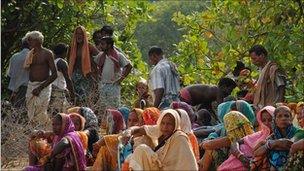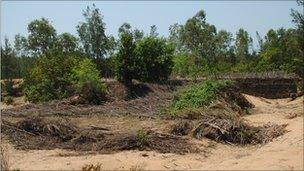India's fields full of dreams
- Published
Nidhi Dutt reports
Ramesh Chandra Rout stands in the blistering morning sun, watching on as his betel leaf vines are flattened.
It does not take long for the team, delegated to his farm by local authorities, to tear down the wooden structures that house his crop.
A loud, unruly crunching sound reverberates through the air as men walk over the destroyed structures; a mess of wood, wire and bright green leaves underfoot.
Like many farmers in Jagatsinghpur district, in rural Orissa, Ramesh has given up his fight.
He has agreed to hand over his land to the state government in return for a one-off compensation payment.
Hard choices, few options
For 25 years Ramesh has been farming betel leaf in the sandy, fertile plains of Jagatsinghpur district.
He says the leaf, a widely consumed delicacy in India, is a reliable and lucrative crop.
The plantation he has given up used to provide him with an income of about $300 (£180) a month, enough to run a household and put two children through school.
He claims the stability of his crop was a key reason why he resisted handing over his land to the state government for six long years.
But eventually he was left with little choice. The authorities have been moving quickly through areas like Jagatsinghpur district to acquire land needed for the development of a 12 million-tonne steel plant by South Korean firm, Posco.
Ramesh accepted a one-off payment of $3,000, the equivalent of one year's earnings, but argues he did so in the face of mounting pressure.
He says he was told by the local authorities that if he did not hand over his land willingly, it would be acquired by force.
In the end, Ramesh says in a resigned tone, there was nothing he could do - he had to make a hard decision but had little choice.
Ramesh admits that he was glad he was able to get some money. But it will not be enough to sustain him in the long term.
Eventually the betel leaf farmer will have to find new land or a new way of earning a living.
Ramesh claims that he has made a big sacrifice for the sake of industrialisation. However, his future, and that of his family, is now uncertain.
Still fighting
It is only 9am but already the soft, sandy earth leading to Nuagaon village is searing.
From the top of a small hill, a line of people clad in hues of bright pink, yellow and green can be seen in the distance.

Locals wait and watch for land acquisition in the area to begin
But this was no welcome party. The villagers of Nuagaon were forming a protest line, waiting for the authorities to come and begin acquiring land in their area.
They sit patiently, almost motionless. Some wait behind thorny branches, intertwined and dug into the sand, a flimsy, desperate line of defence.
Abhay Sahoo, the chairman of the Posco Pratirodh Sangram Samiti, the anti-Posco movement, addresses the crowd, urging them to continue their struggle.
Nuagaon is one of the last bastions of resistance to the Posco development.
Mr Sahoo says he continues to fight against the arrival of big industry because such a development will cause widescale environmental damage and destroy the livelihoods of thousands of local people.
He says the villagers of Nuagaon will continue to protest peacefully for as long as they can.
The use of force by the authorities to break up the resistance will only strengthen the opposition movement further, he says.
When the government of Orissa signed a memorandum of understanding with Posco in 2005, it sparked a wave of opposition, both in the region and across the country.
Assured future
But over the years some local groups have come around.
The United Action Committee (UAC) led by Anadi Charan Rout, widely supports the Posco development.
While it considers the steel plant to be a good thing for the region, over the years it has also pressed the authorities for guarantees of stable jobs and better compensation for all local people affected by the plans.

Betel vine plantations are being flattened to make way for the Posco steel plant
When asked why the UAC had convinced hundreds of local families to hand over their land, Mr Rout explains that it is a matter of survival, not just for individuals but for entire communities.
He claims that the water table in the region has fallen dramatically in recent years, making it harder to earn a substantial living from agriculture.
Mr Rout insists that even betel leaf cultivation in the area has been affected by the changing ground conditions.
He adds that even good land in the area is difficult to farm, with water-logging posing a major problem during the monsoon season.
According to Mr Rout, industrialisation is the only way to ensure that places like Jagatsinghpur district stay on the map.
He strongly denies that the UAC has anything to gain from the state or from Posco for encouraging local people to agree.
He insists that his group is merely pointing out the benefits of a viable, long-term solution to the problems faced by thousands of local people year after year.
Untapped wealth
The east Indian state of Orissa is mineral rich. For years iron ore and other natural minerals have lured major mining companies to the state.
Mining firms, domestic and foreign, are lining up to sign memorandums of understanding and big contracts with the state government.
However, over the years the government has also begun to push for a better deal for the state and its citizens.
Under new regulations, firms will reportedly be allowed to mine for materials like iron ore in Orissa, but only if they establish processing plants there as well, creating long-term jobs and secondary industry.
In the case of Posco the federal government has hinted that the firm may be prevented from exporting the best quality iron ore that it mines.
According to Raghunath Mohanty, minister for steel and mines in Orissa, the Posco project will generate tens of billions of dollars in revenue and create close to one million jobs over 35 years.
Orissa holds more than 30% of the country's iron ore deposits and Mr Mohanty argues that ways and means to exploit such natural wealth must be found.
He says the government always expects some level of opposition, but adds that challenges, such as the resistance in Jagatsinghpur district, need to be met "at any cost".
Dealing with development
The government is still trying to acquire the remaining few hundred acres of land required for the project.
Ultimately, the steelworks plant will be spread across 4,004 acres.
It will be at least five years before it is operational.
Experts say that those in charge of overseeing significant, long-term projects in India face a big challenge.
They need to balance the country's industrialisation with the needs and demands of the people such projects affect the most.
Critically, observers argue this must pertain to issues such as the acquisition of land, the payment of adequate compensation, and the guarantee of viable ways for local people to earn a living long after the deal is done.
- Published3 May 2011